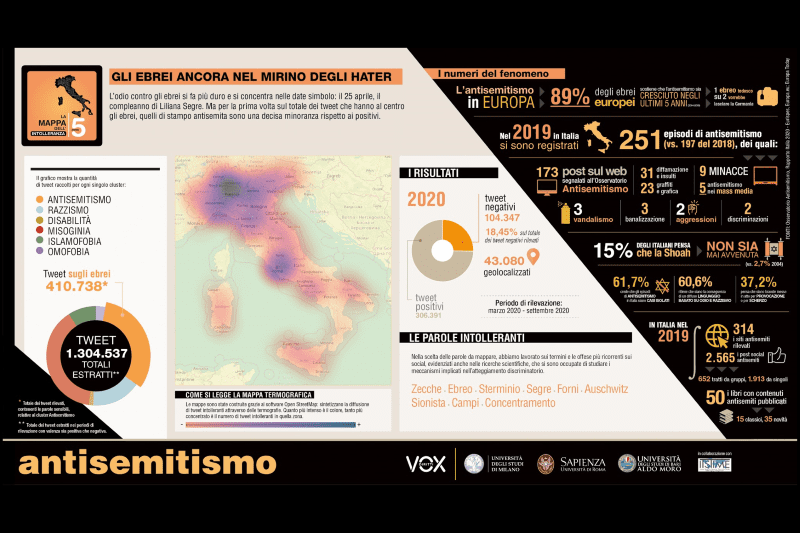The annual report of the Vox Rights Observatory on discrimination in Italy, including antisemitism, was presented again this year . A report that, now in its 5th edition, was presented on Thursday 3 December in a direct Facebook organized by the National Network for the fight against speech and hate phenomena. Also this year the relationship was born from the collaboration of 3 different universities (the State University of Milan, the Catholic University and the University of Bari Aldo Moro).
Silvia Brena , journalist and co-founder of Vox Rights, highlighted through various slides how antisemitic tweets have increased significantly since 2016, the year of the first report: at the time, out of the total number of tweets talking about Jews, only 2.2% expressed negative feelings; a percentage that has grown gradually, first passing to 3.8% in the 2017/2018 period, then to about 10% in the period March / May 2019 and, finally, reaching the peak of 25% in the period October / December of the same year . In 2020, however, the data indicated 18.4% of negative tweets on the total, marking a decrease compared to the previous year.
The cities from which the greatest number of antisemitic tweets come are: Rome (9,615), Milan (3,086), Florence (1,289) and Turin (1,064). In general, most of these are concentrated around particular periods or events, such as the demonstrations on April 25 or Liliana Segre’s birthday on September 10. Other situations related to news events that triggered the trolls were the threats against Emanuele Fiano on June 6 and the case of the French comedian Dieudonne, who on August 3 was banned by Facebook for inciting hatred.
Betti Guetta, head of the CDEC’s Antisemitism Observatory, which helped draft the part of the report on antisemitism, explained that he had done “mainly quantitative research,” mainly on a poll basis. “By now we all know that hatred has moved on the web for 10-15 years, so we can’t not follow social media.” From their studies, he explained, much of what happens online then also moves into the real world, “they are not two different worlds.” He added that although many social networks like Facebook and Twitter have slowly taken a stand against these phenomena, the most uncompromising haters have moved on to other social networks, such as VK, which offer them more freedom.






